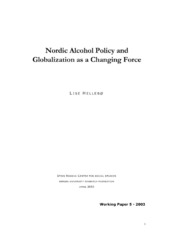| dc.contributor.author | Hellebø, Lise | eng |
| dc.date.accessioned | 2006-06-21T15:22:01Z | |
| dc.date.accessioned | 2020-12-10T06:31:52Z | |
| dc.date.available | 2006-06-21T15:22:01Z | |
| dc.date.available | 2020-12-10T06:31:52Z | |
| dc.date.issued | 2003-04 | eng |
| dc.identifier.issn | 1503-0946 | |
| dc.identifier.uri | https://hdl.handle.net/1956/1402 | |
| dc.description.abstract | Several recent studies argue that the Nordic alcohol policy, based on restrictive measures and aimed at reducing consumption, is changing. This paper discusses the potential impact of globalization on Nordic Alcohol policy – exemplified by the liberalising efforts of the World Trade Organization (WTO). Two countries; Norway and Sweden, are in focus. Three types of integration; positive integration, negative integration and “framing” integration, are introduced in order to characterize the influence of the WTO. Relevant WTO agreements and national participation patterns in the WTO organisation are accounted for. A conclusion is that the WTO has indeed influenced and to some extent changed alcohol regulation in many countries. This is mainly a result of efforts to reduce trade barriers. Public health motivated arguments have so far not had any weighty importance in the WTO. The influence of the WTO can mainly be assessed as negative integration through liberalization efforts, and as “framing” integration as influence on norms and cognition of involved actors. The more direct and prescriptive pressure from positive integration is less evident. Established national institutions and traditions can to some extent resist and modify externally initialised reforms. At the same time, the Nordic countries are highly globalised, and the further globalization pressure is powerful. Increasing liberalization efforts from the WTO must be followed with vigilance from actors in the national and Nordic alcohol policy field, if the traditional Nordic Alcohol policy is to remain standing. | en_US |
| dc.description.abstract | Nordisk alkoholpolitikk, tradisjonelt basert på en restriktiv linje og med en målsetting om å redusere det totale alkoholinntaket, er i endring. Dette slås fast i flere studier som nylig er utgitt. Dette notatet diskuterer globaliseringens innflytelse i den endrete nordiske alkoholpolitikken, eksemplifisert ved den liberaliseringen som skjer gjennom Verdens Handelsorganisasjons (WTO) innflytelse. To land, Norge og Sverige, vies særlig oppmerksomhet. WTOs potensielle innflytelsen karakteriseres ved hjelp av tre integrasjonstyper – positiv integrasjon, negativ integrasjon og “framing” integrasjon. Relevante WTO-avtaler og nasjonal deltakelse i WTOs organisasjon gjennomgåes. En konklusjon er at WTO har påvirket og til en viss grad endret alkoholreguleringen i flere land. Dette er hovedsakelig et resultat av WTOs arbeid for å redusere handelshindringer mellom land. Helserelaterte argumenter har så langt ikke hatt noen særlig gjennomslagskraft innenfor WTO-samarbeidet. Innflytelsen fra WTO kan hovedsakelig forstås som negativ integrasjon gjennom liberalisering, og som “framing” integrasjon gjennom påvirkning av nasjonale aktørers normer og oppfatninger. Den mer direkte innflytelsen i form av positiv integrasjon er ikke like tydelig. Etablerte nasjonale institusjoner og tradisjoner kan i stor grad motstå og modifisere reformforsøk utenfra. Samtidig kan nordiske land karakteriseres som sterkt globaliserte, og sannsynligheten for endringer på grunn av en økende globalisering er stor. Om det er et mål at den tradisjonelle nordiske alkoholpolitikken skal bestå, bør derfor et økende liberaliseringspress fra WTO følges med årvåkenhet fra aktørene innenfor nordisk alkoholpolitikk. | no |
| dc.format.extent | 493334 bytes | eng |
| dc.format.mimetype | application/pdf | eng |
| dc.language.iso | eng | eng |
| dc.publisher | Stein Rokkan Centre for Social Studies | eng |
| dc.relation.ispartofseries | 5-2003 | |
| dc.relation.ispartofseries | Working Paper | en |
| dc.title | Nordic Alcohol Policy and Globalization as a Changing Force | eng |
| dc.type | Working paper | eng |
| dc.subject.nsi | VDP::Samfunnsvitenskap: 200 | nob |
